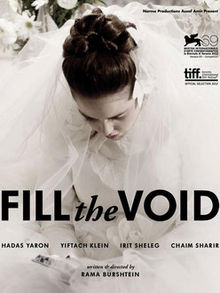
by Amy Stone
‘Fill the Void’ with Hasidic Dream Men
 Park your Jewish feminist preconceptions at the door of this Israeli “insider film” on life within the world of Tel Aviv Hasidim.
Park your Jewish feminist preconceptions at the door of this Israeli “insider film” on life within the world of Tel Aviv Hasidim.
“Fill the Void” (“Lemale et ha’Chalal”) made its U.S. premiere in October at the 50th New York Film Festival, following its world premiere at the Venice Film Festival, where lead actress Hadas Yaron received Best Actress award. This is the story of a young Hasidic woman pressured to marry her brother-in-law after her sister dies in childbirth.
Don’t expect the bitter tale of a teen-ager whose dreams and youth are sacrificed to an ultra-Orthodox society in need of childcare. This first feature film written and directed by 45-year-old Rama Burshtein, a happily Hasidic New York-born Israeli, is gentle, sweet and totally self-contained. The outside world remains outside the close-knit community of well-dressed Hassids with international connections. Clothed in the time warp of a vanished East European Jewry, the men wear white knee socks, silken holiday robes that anywhere else would be luxe bathrobes, and shtreimels (fur hats) the size of lampshades. The wives cover their heads with stylish turbans – silk wrappings in faux leopard prints. But the feeling is anything but antique; this is an observant way of life that’s alive and well.
The film captures the excitement of 18-year-old Shira, played by Hadas Yaron, at the feel of chemistry at the matchmaker’s choice of a husband. We totally accept her framework of the arranged marriage of two teen-age innocents and their families. We feel her angst when wedding plans get put on hold with her sister’s death and the potential groom’s family moves on. It feels like the caravan has come to shop and cannot tarry. It is time for the young man to wed. The young woman is left behind.
What’s surprising in this made-for-the-secular-world film of Hasidic life is that the leading men are kind and sensitive while most of the women are scheming. Shira’s mother, self-described as losing her mind with grief, pounces on the idea of marrying Shira off to son-in-law Yochay (played by Yiftach Klein), to keep her new grandson nearby. Shira’s aunt – born without arms – does her own controlling moves, and one can only imagine that this helpless woman symbolizes the state of the ultra-Orthodox woman, at least for feminists if not for the filmmaker. And there’s the sadness of the aging single woman in the marriage-and-children-based society. This lively unmarried red head turns nasty when the subject of marriage comes up.
But the men, the men – would that such sensitive creatures existed beyond the never-never land of film. Shira’s father wants to know what Shira wants. Yochay also cares. They sound truly concerned. (The darkly handsome Yochay’s one slip from perfection is when he calls the vulnerable Shira cruel. Get me rewrite.) The community’s rabbi is also a man of total compassion. Dressed in his long black- and-white silk holiday robe, he leaves a fraught family gathering to advise a friendless, manipulative widow on buying a stove.
The film’s rich texture keeps it engrossing. Not all the film’s men are caring and supportive. At the Purim gathering where Shira’s father hands out piles of money to the males of the community, one complains that his wife is mentally ill and demands more money. (The matchmaker unloaded damaged goods.)
But long/short, “Fill the Void” is a lovely Hasidic tale. Burshtein, a totally secular Jew who studied filmmaking at the Sam Spiegel Film and Television School in Jerusalem, became almost instantly religious 20 years ago after just two Sabbaths. Now she has translated the art of filmmaking, which is storytelling, into the art of filmic Hasidic storytelling. Burshtein dedicated the film to her husband, and it truly is a love story for him.
Speaking at the New York Film Festival screening, one of the most interesting comments from this nicely plump, modestly dressed mother of four was that the Israeli Orthodox film industry is totally female. In fact, many of Burshtein’s films are for women only. The Israeli Hasidic community will not be crossing into the secular world to see public screenings of “Fill the Void,” but Burshtein predicts they will be watching her film at home on DVD.
Closer to American homes, Sony Pictures Classics has acquired the North American distribution rights. We should be seeing “Fill the Void” within the year.